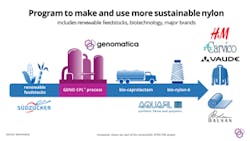Project EFFECTIVE Increases Sustainable Materials Adoption
Aquafil and Genomatica have come together to form Project EFFECTIVE, a multi-company collaboration to produce more sustainable fibers and plastics for commercial use by using renewable feedstocks and bio-based technologies. With participation from 12 companies, including brands like H&M, Carvico, Vaude, and Balsan, Project EFFECTIVE is one of the broadest industrial-driven efforts to reshape entire product value chains and drive economic growth.
One of the key objectives of Project EFFECTIVE is to develop a more sustainable nylon, made from bio-based technologies like caprolactam produced using renewable feedstocks. The nylon will be validated by brands to make apparel and carpet textiles.
Engaging Brands at the Beginning
An advantage of Project EFFECTIVE is the early involvement of major consumer brands, allowing them to contribute valuable customer- and industry-driven perspectives. This brand participation is expected to facilitate broader and faster adoption of bio-based technologies and products. Brands will better understand what monomers, polymers, and sustainability initiatives are commercially available, enabling them to develop more effective plans with suppliers regarding bio-based ingredients and materials.
Participants and Funding
Project EFFECTIVE’s stakeholders span eight countries and are leaders in renewable feedstocks, conversion technologies, makers of intermediate and finished products, major consumer brands, bio-based technologies, and recycling technologies.
The initiative is funded in part through a grant from the Bio-Based Industries Joint Undertaking, a public/private partnership between the European Union’s Horizon 2020 program and the Bio-based Industries Consortium. Aquafil and Genomatica’s agreement announced in early 2018 will pave the way toward the industrial production of bio-based nylon.
“This consortium is an important step toward a more circular economy,” said Giulio Bonazzi, Chairman and CEO of Aquafil. “Together we will drive new waves of healthy industrialization, economic growth, and greater sustainability–better than we can individually.”
Christophe Schilling, CEO of Genomatica, added, “More renewables in product value chains means more impact. More and more manufacturers and brands get it; more and more are taking action. We look forward to rapidly expanding the circle of action.”
